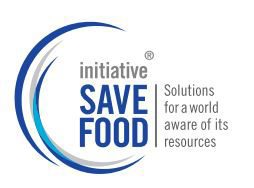Author Archives: Christian Hallmark
- October 1, 2015
-
- September 23, 2014
-
Refrigeration Industry Leaders Organize Global Food Cold Chain Council to Reduce Food Spoilage, Increase Efficiency, and Reduce HFC Emissions
Category : Press Release
New York, NY – September 23, 2014— A coalition of major companies that comprise the supply chain necessary to move cold food products from field to market around the world today announce the organization of the Global Food Cold Chain Council. This initiative seeks to reduce greenhouse gas emission in the processing, transportation, storage and retail display of cold food and to stimulate demand for climate-friendly technology. The announcement was made by the Alliance for Responsible Atmospheric Policy, with the
This private sector initiative will promote efforts that stimulate demand for climate-friendly technologies while reducing refrigerant emissions, and minimizing food spoilage, and enhancing energy efficiency in the food cold chain. The initiative will also work with partners in the CCAC (Climate and Clean Air Coalition) to develop and implement broad-based public and private sector collaborative solutions to reduce hydrofluorocarbon (HFC) emissions in the cold food chain across developed and developing countries. The council will work with individual businesses, associations, governments, and civil society.
“The food cold chain is responsible for nearly one third of global HFC emissions. The GFCCC is part of the Alliance’s comprehensive approach to achieving the global reduction of high-GWP HFCs,” said Alliance Executive Director Kevin Fay.
The growth of HFC emissions has been identified as a significant concern. HFCs are compounds that were introduced to replace ozone depleting substances being phased out by the Montreal Protocol. Currently HFCs only comprise about 1 percent of global greenhouse gas emissions. However, unabated, HFCs are expected to increase to greater than10 percent of greenhouse gas emissions by 2050.
A more climate-friendly cold chain will not only reduce its own carbon footprint, it will extend food supplies to feed more people and reduce the estimated 3.3 billion metric tons of CO2- equivalent in food waste every year. If it were a country, food waste would be the third largest emitter of greenhouse gases.
The Alliance and AHRI participated last week in an HFC Industry Leadership Roundtable at the White House. At that meeting, Alliance member companies and others announced their voluntary commitments to introduce new low-global warming potential (GWP) compounds and technologies to replace the high-GWP compounds and technologies currently in use, and to continue to improve energy efficiency as well. The industry will invest $5 billion over the next decade to research, develop, and commercialize low-GWP technologies new refrigerants and the equipment in which they will be used. The Alliance pledged to take actions and support policies to reduce global HFC emissions by 80 percent by 2050. The industry leaders advocated for the North American-proposed amendment to the Montreal Protocol as the best means of achieving a global phase-down of HFCs while increasing research and development of the next generation of refrigerants.

